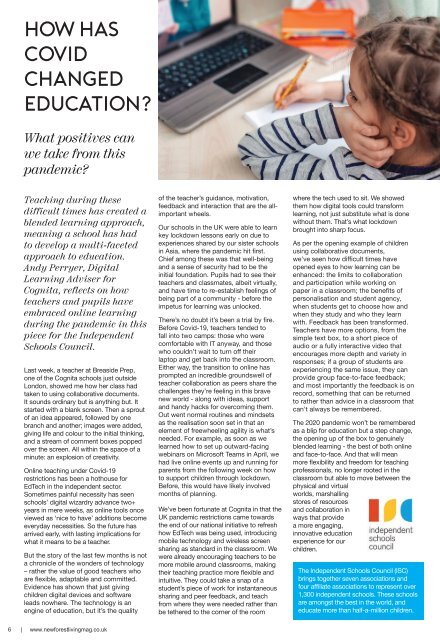New Forest Living Sep - Oct 2020
We celebrate the best of autumn, with delicious recipes from James Martin plus a host of interiors inspiration to make you love home again.
We celebrate the best of autumn, with delicious recipes from James Martin plus a host of interiors inspiration to make you love home again.
Create successful ePaper yourself
Turn your PDF publications into a flip-book with our unique Google optimized e-Paper software.
How has<br />
covid<br />
changed<br />
education?<br />
What positives can<br />
we take from this<br />
pandemic?<br />
Teaching during these<br />
difficult times has created a<br />
blended learning approach,<br />
meaning a school has had<br />
to develop a multi-faceted<br />
approach to education.<br />
Andy Perryer, Digital<br />
Learning Adviser for<br />
Cognita, reflects on how<br />
teachers and pupils have<br />
embraced online learning<br />
during the pandemic in this<br />
piece for the Independent<br />
Schools Council.<br />
Last week, a teacher at Breaside Prep,<br />
one of the Cognita schools just outside<br />
London, showed me how her class had<br />
taken to using collaborative documents.<br />
It sounds ordinary but is anything but. It<br />
started with a blank screen. Then a sprout<br />
of an idea appeared, followed by one<br />
branch and another; images were added,<br />
giving life and colour to the initial thinking,<br />
and a stream of comment boxes popped<br />
over the screen. All within the space of a<br />
minute: an explosion of creativity.<br />
Online teaching under Covid-19<br />
restrictions has been a hothouse for<br />
EdTech in the independent sector.<br />
Sometimes painful necessity has seen<br />
schools’ digital wizardry advance two+<br />
years in mere weeks, as online tools once<br />
viewed as ‘nice to have’ additions become<br />
everyday necessities. So the future has<br />
arrived early, with lasting implications for<br />
what it means to be a teacher.<br />
But the story of the last few months is not<br />
a chronicle of the wonders of technology<br />
– rather the value of good teachers who<br />
are flexible, adaptable and committed.<br />
Evidence has shown that just giving<br />
children digital devices and software<br />
leads nowhere. The technology is an<br />
engine of education, but it’s the quality<br />
of the teacher’s guidance, motivation,<br />
feedback and interaction that are the allimportant<br />
wheels.<br />
Our schools in the UK were able to learn<br />
key lockdown lessons early on due to<br />
experiences shared by our sister schools<br />
in Asia, where the pandemic hit first.<br />
Chief among these was that well-being<br />
and a sense of security had to be the<br />
initial foundation. Pupils had to see their<br />
teachers and classmates, albeit virtually,<br />
and have time to re-establish feelings of<br />
being part of a community - before the<br />
impetus for learning was unlocked.<br />
There’s no doubt it’s been a trial by fire.<br />
Before Covid-19, teachers tended to<br />
fall into two camps: those who were<br />
comfortable with IT anyway, and those<br />
who couldn’t wait to turn off their<br />
laptop and get back into the classroom.<br />
Either way, the transition to online has<br />
prompted an incredible groundswell of<br />
teacher collaboration as peers share the<br />
challenges they’re feeling in this brave<br />
new world - along with ideas, support<br />
and handy hacks for overcoming them.<br />
Out went normal routines and mindsets<br />
as the realisation soon set in that an<br />
element of freewheeling agility is what’s<br />
needed. For example, as soon as we<br />
learned how to set up outward-facing<br />
webinars on Microsoft Teams in April, we<br />
had live online events up and running for<br />
parents from the following week on how<br />
to support children through lockdown.<br />
Before, this would have likely involved<br />
months of planning.<br />
We’ve been fortunate at Cognita in that the<br />
UK pandemic restrictions came towards<br />
the end of our national initiative to refresh<br />
how EdTech was being used, introducing<br />
mobile technology and wireless screen<br />
sharing as standard in the classroom. We<br />
were already encouraging teachers to be<br />
more mobile around classrooms, making<br />
their teaching practice more flexible and<br />
intuitive. They could take a snap of a<br />
student’s piece of work for instantaneous<br />
sharing and peer feedback, and teach<br />
from where they were needed rather than<br />
be tethered to the corner of the room<br />
where the tech used to sit. We showed<br />
them how digital tools could transform<br />
learning, not just substitute what is done<br />
without them. That’s what lockdown<br />
brought into sharp focus.<br />
As per the opening example of children<br />
using collaborative documents,<br />
we’ve seen how difficult times have<br />
opened eyes to how learning can be<br />
enhanced: the limits to collaboration<br />
and participation while working on<br />
paper in a classroom; the benefits of<br />
personalisation and student agency,<br />
when students get to choose how and<br />
when they study and who they learn<br />
with. Feedback has been transformed.<br />
Teachers have more options, from the<br />
simple text box, to a short piece of<br />
audio or a fully interactive video that<br />
encourages more depth and variety in<br />
responses; if a group of students are<br />
experiencing the same issue, they can<br />
provide group face-to-face feedback;<br />
and most importantly the feedback is on<br />
record, something that can be returned<br />
to rather than advice in a classroom that<br />
can’t always be remembered.<br />
The <strong>2020</strong> pandemic won’t be remembered<br />
as a blip for education but a step change,<br />
the opening up of the box to genuinely<br />
blended learning - the best of both online<br />
and face-to-face. And that will mean<br />
more flexibility and freedom for teaching<br />
professionals, no longer rooted in the<br />
classroom but able to move between the<br />
physical and virtual<br />
worlds, marshalling<br />
stores of resources<br />
and collaboration in<br />
ways that provide<br />
a more engaging,<br />
innovative education<br />
experience for our<br />
children.<br />
The Independent Schools Council (ISC)<br />
brings together seven associations and<br />
four affiliate associations to represent over<br />
1,300 independent schools. These schools<br />
are amongst the best in the world, and<br />
educate more than half-a-million children.<br />
6 | www.newforestlivingmag.co.uk


















